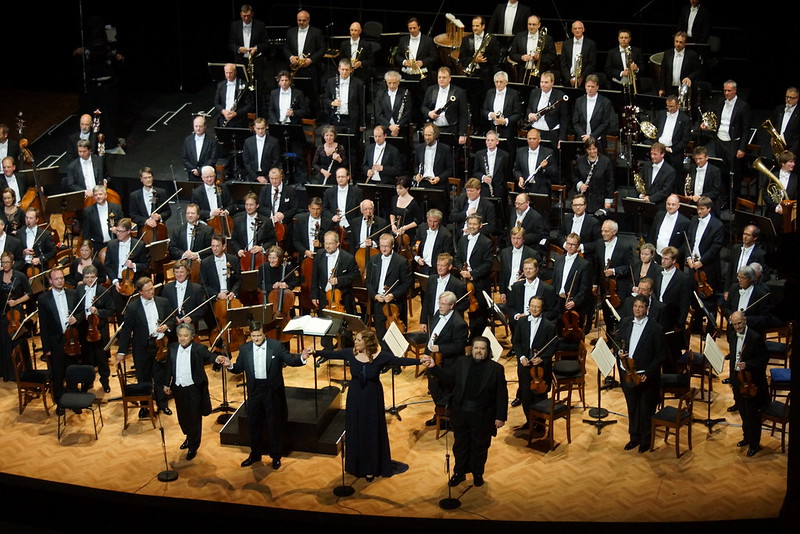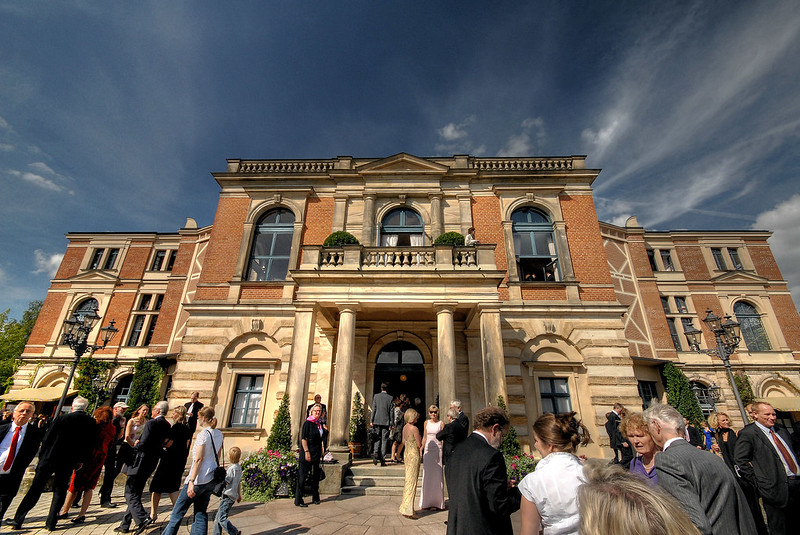Bayreuth Festival
Wagner’s Dream Resonates on the Green Hill
2026/07/24 - 2026/08/29
Every summer, the small Bavarian city of Bayreuth becomes a sacred destination for opera lovers from around the world. The Bayreuth Festival, held in the Bayreuth Festspielhaus-a theater designed by Richard Wagner himself specifically to stage his operatic masterpieces-runs for four to six weeks from late July to the end of August. More than 50,000 people from across the globe gather to immerse themselves in Wagner’s world of music and drama. Whether you’re a devoted Wagnerian, a classical music enthusiast, or simply eager to experience one of Europe’s most storied festivals, Bayreuth promises a special encounter with history, artistry, and passion.
Set against the green hills of Franconia, both first-time visitors and lifelong pilgrims are welcomed into the very theater Wagner envisioned, where a summer of myth, innovation, and musical magic awaits.
Main Attractions
The Festspielhaus and Wagner’s Operas
The centerpiece of the festival is the Bayreuth Festspielhaus, designed by Wagner himself. Its unique, hidden orchestra pit beneath the stage creates an acoustic effect as if the music is rising directly from the stage, enveloping the audience. Each year, the festival features a rotating selection of Wagner’s ten major operas, with favorites such as the “Ring Cycle,” “Tristan und Isolde,” “Parsifal,” and “Die Meistersinger von Nürnberg.”
Opening Gala, Star Performers, and Artistic Innovation
The festival opens with a red carpet gala attended by celebrities, artists, and Wagner fans from around the world. Each performance is a major artistic event, led by world-renowned conductors and singers, ranging from traditional stagings to avant-garde interpretations. The “Diskurs Bayreuth” series offers lectures and talks with artists and scholars, while “Wagner for Children” introduces the magic of opera to younger audiences.
Distinctive Dress Code and Festive Atmosphere
Attending the Bayreuth Festival is a ritual in itself. While there is no strict dress code, the opening night sees a parade of tuxedos, evening gowns, silk shawls, and traditional attire. During intermissions, guests stroll the green hill with a glass of Franconian wine, sharing the excitement before the curtain rises again. Around the venue, both formally dressed guests and casual tourists mingle, each enjoying the summer air in their own way.
Franconian Cuisine and Festival Flavors
One of the delights of the Bayreuth Festival is the traditional cuisine of Franconia, a region in northern Bavaria. Franconian food is known for its hearty, rustic flavors-meats, sausages, potatoes, and tangy side dishes. Before and after performances, you can savor thick, juicy Bayreuth bratwurst, “Blaue Zipfel” (sausages simmered in white wine and vinegar), “Stadtwurst mit Musik” (cold sausage with onions and vinegar), and “Brotzeit” platters with ham, cheese, bread, and radishes. Local beer is served in ceramic steins, and bakeries offer “Kerwa Küchla,” a sugar-dusted fried pastry. In Bayreuth’s historic restaurants, you’ll find everything from classic Franconian dishes to modern fusion cuisine.
Cultural and Historical Background
The Bayreuth Festival was founded in 1876 by composer Richard Wagner as a one-of-a-kind event to realize his vision for the ideal performance of his music dramas, especially the “Ring Cycle.” Wagner personally oversaw the construction of the Festspielhaus on the green hill outside Bayreuth, introducing innovative features such as the hidden orchestra pit and darkened auditorium to focus the audience’s attention on the stage. At the inaugural festival, German Emperor Wilhelm I, French composer Saint-Saëns, Russian composer Tchaikovsky, and other European nobility and artists attended, instantly making Bayreuth a world-renowned pilgrimage site for music.
Over nearly 150 years, the Bayreuth Festival has survived two world wars, political upheaval, and artistic revolutions, all while remaining under the stewardship of the Wagner family. After World War II, Wieland Wagner’s minimalist stagings and modern interpretations brought new life to the festival, which has always balanced tradition with innovation. For many, attending Bayreuth is a once-in-a-lifetime dream. Experiencing Wagner’s works in the theater he designed, surrounded by the landscape and history that inspired him, is a living testament to artistic ambition, cultural continuity, and the power of music.
The greatest significance of the Bayreuth Festival lies in how it keeps Wagner’s artistic vision alive as a “total work of art”-a synthesis of music, drama, stagecraft, and architecture. Hearing Wagner’s operas at the Festspielhaus offers audiences the ideal sound and immersive experience the composer imagined. The festival has also transformed Bayreuth from a small town into a world-class cultural city, boosting the local economy and tourism. Above all, Bayreuth Festival is a living cultural heritage, where art transcends time and borders, uniting people and embodying both tradition and innovation.
Participant Voices
I’m new to Wagner, but the atmosphere was truly special. I wore my favorite dress and felt like I was part of something grand. The city itself was charming-after the performance, I strolled through illuminated parks and ended the night with bratwurst and local beer. I can’t wait to return.
Fun Facts
- The Bayreuth Festival was founded in 1876 and is the only festival in the world dedicated exclusively to Wagner’s works.
- Tickets are extremely hard to get-some people wait as long as ten years.
- Wagner’s former home, Wahnfried, is now a museum where you can visit his grave and see personal artifacts.
- Bayreuth is also famous for its beer gardens, baroque palaces, and the UNESCO World Heritage Margravial Opera House.
Festival Dates
The Bayreuth Festival is held every year from late July to the end of August at the Bayreuth Festspielhaus. For tickets and more information, visit the official website: www.bayreuther-festspiele.de.
The event schedule is subject to change. Please check the official website for the most up-to-date information.
Information
| Name | Bayreuth Festival |
| Country | Germany |
| Area | Bayreuther, Bayreuther Festspielhaus |
| Date | 2026/07/24 - 2026/08/29 |
| Link |
Upcoming Festivals
Kukeri(Surva) Bulgaria
Bulgaria’s Festival of Spirits, Fire, and Bells That Drives Away Winter
2026/01/22Dinagyang Philippines
Iloilo’s Thunderous Festival of Faith, Tradition, and Dance
2026/01/22The Northern Lights Festival (Nordlysfestivalen) Norway
A Tromsø Miracle: Music and Aurora Dancing in the Arctic Night
2026/01/25Carnavales de Ituren y Zubieta Spain
Ancient Echoes and the Festival that Awakens Spring in the Basque Mountains
2026/01/26Up Helly Aa United Kingdom
A Night When Fire and Viking Pride Blaze in Shetland
2026/01/29Winterlude Canada
A Wonderland of Ice, Light, and Smiles in Canada’s Capital Region
2026/01/30Carnival of Viareggio (Carnevale de Viareggio) Italy
A Spectacular Parade of Giant Papier-Mâché Masterpieces
2026/01/30Fiesta de la Candelaria(Virgin of Candelaria) Peru
A Grand Dance Festival of Faith and Folklore Echoing on the Shores of Lake Titicaca
2026/01/31Thaipusam Malaysia
A Pilgrimage of Prayer and Penance Illuminates Batu Caves
2026/01/31Jaisalmer Desert Festival India
When Rajasthan’s Golden Dunes Dazzle with Color and Culture

